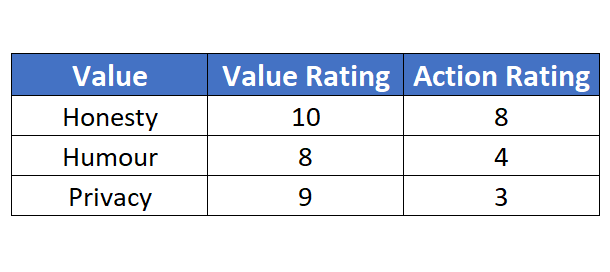Core Values – Do you know yours?
Summary
People act as they do for a reason. Sometimes they know why, and sometimes they don’t. I’ve long been curious as to why this is the case, and have spent time recently considering how, where, and when core values play a role in a person’s overall psychological structure. In this blog we’ll work through what core values are, some questions you can consider for your own understanding, and finish with a model that I use with clients to help understand and qualify their core values.
Background
Following on from Blog #3 (Pendulum Reactions), I wanted to dive a little deeper into some possible reasons for why these reactions happen. Most people I interact with act as they do for a reason. My life goal is to get so inquisitive about the reasons that I can adjust my reaction to their behaviours so as not to exacerbate any negativity in the moment, and to see if there are opportunities to help them move from a conflict / negative state, to one more on the peaceful / positive side. Now, as I mentioned previously, pendulum reactions aren’t always negative – you could be swinging from a negative state to something wholly positive or euphoric. If that’s the case, I still get inquisitive as to establishing the reasons for this swing, and to explore opportunities to help them reduce the swing and manage themselves to a more positive energy state of being, more regularly.
So, I started to ask myself “When working with clients or dealing with people in general (personally or professionally), what are some of the potential foundational circumstances that could cause a pendulum reaction?” Through my coaching training, one area I became very curious to discover more about was people’s values:
- What are they?
- Who has them?
- How do you find out yours?
- Why do they matter?
- When are they important?
- Where do they show up?
- What do they do?
- Will they change over time?
- Do I need to evaluate them periodically?
This is what we’ll explore further on this blog. Note: For the purposes of following the materials, my main angle is personal values, but the content could also be applied through a cultural, organizational, or societal lens.
Why Write About Values
Typically, where I’m going with sharing this information is trying to build on materials already published on the other blogs on the site. The ideal scenario is that each blog would successively follow previous blogs and you’d have a continuous suite of reference materials that while informative as a stand-alone topic, that could also be read in sequence to paint a fuller picture. Unfortunately, my brain doesn’t fully work in perfect linearity and I’m not smart enough to have had that thought when I started all of this, so while there will be reference to other blogs from time to time, the logical sequencing won’t quite be a feature. That said, it was always my plan to discuss values early in our journey together as I truly believe time spent understanding these within ourselves (and understanding them early) helps create a tremendous foundation from which to build a truer, deeper understanding of self.
Values – Definition
Right, let’s start this section with a Gary-isized definition. Doing a quick search of various values definitions, here’s a bit of an amalgam of what I could find out there: A person’s values are their principles or standards of behavior; their judgment of what is and is not important in life.
The three words that stick out for me in the above statement are:
- Principles – our foundational baseline of conduct or self-management
- Standards – our morals, ethics, habits, and behaviours
- Important – how much something matters to us
It’s important to establish your own principles, standards, and level of importance to be able to help guide your thoughts, feelings, and actions. With little knowledge of, or regard for, the key facets of your values, the less foundational structure you’ll have in your behaviour, and the more opportunity you will have for inconsistencies, erratic tendencies, and general confusion on why you’re acting the way you’re acting.
A key principle I learned during my training is: If you are happy, content, and generally content in your life, your values are being honoured. If the opposite emotions are in play, your values are being compromised. Seems simple enough to read it in that way, doesn’t it? Imagine how difficult it is to decipher if you have no clear understanding of your core values.
Why Are Values Important?
Like other topics covered in the site blogs, the main reason for writing about this is primarily to raise your consciousness of an important self-awareness topic. Understanding your own values is important as they will help create a principle-centered framework for how you act, react, and generally behave. This framework will help you to:
- Create boundaries– For yourself and others via demonstrable behaviours and clear communications
- Make decisions– Make clear, focused, personally ethical decisions
- Set priorities– By clearly clarifying what is and is not important to you, you can prioritize your goals and actions accordingly
- Grow and develop– Your ‘moral compass’ will ensure you spend time only on things that matter to you, leading to life growth through ongoing development
- Build strong relationships / strengthen existing relationships– Living your values will help shape who is actively ‘in’ and ‘out’ of your life. While we don’t always have the luxury of choosing everyone we have in our lives, we do have the right to live to our values every day. In doing so, you will be positioned to build strong(er) relationships with those you bring into your circle and/or create further meaning in existing relationships
- Foster positivity– When you and others know where you stand with each other, positivity grows. This is further amplified when you share common values with others
- Know that you are living The Best You (see what I did there?)
How Do I Know What My Core Values Are?
How do I discover or reaffirm my values, Gary? If that’s what you’re asking right now, then you’re in the right place! There are a variety of ways to discover or reaffirm your core values. My belief is that as part of our core being, we have 3-5 values that are absolute; they won’t change regardless of where our life journey takes us. At any given point in our life journey, we can have secondary values; these could be transient and specific to a particular life event, career choice, relationship status, health situation, or general human being circumstance. Being a secondary value does not mean it is any less important than the core values, nor would it be given less attention or taken less seriously. A secondary value simply means it can change over time up to and including disappearing altogether. The reason this is important is that consistently trying to live to more than 5 core values at any given time can be an overwhelming task for anyone.
How to discover or reaffirm your values. I learned the following techniques during my iPEC training, and it has worked well for my clients and me:
- Create a table with 3 columns (Value, Value Rating, Action Rating)
- In the Value column, write down as many words as you can think of for values. It is important that you take the lead on this part of the exercise as the words must be meaningful to you. It does not matter whether they are meaningful values to you (the Action Rating will address the values of lesser importance to you).
- Some suggestions to get you going: Honesty, Humour, Loyalty, Privacy, Respect, Service, Trust, etc.
- Once you have the list, in the Value Rating column, rank each word (use whatever scale that is most meaningful for you, e.g., 1-5, 1-10 – 1 being ‘not important at all’, 5 or 10 being ‘the most important thing ever’)
- In the Action Rating column, detail (using the same ranking scale you used for your Value Rating) how often you put the value into action. This will start to help you determine whether you’re truly serious about a value’s importance to you
- Rank and analyze your first pass to see where you landed. Did the values you thought would be at the top, make it to the top? If not, why not?
- You can conduct as many passes as you need to get to your core values (3-5). Secondary values can come later

Once you have your core values established, I’d encourage you to write them down somewhere prominent as a reminder. Then, when you find yourself in an emotional circumstance (positive or negative), think of your core values as an indicative marker as to why you’re thinking, feeling, and/or acting the way you are. This will provide you with more enlightenment on your own thoughts and beliefs and will give you a solid foundation from which to build into the person you deserve to be – The Best You.

I’m always open to a conversation on your thoughts, opinions, and experiences on this or any topic in the library. Get in touch by subscribing below, or by using the form on the contacts page of the site.
Subscribe
As we continue to build our community, I will be sharing regular blogs and other topical and educational materials. If you’d like to receive notifications in your inbox when these are posted, please pop your email address in the box provided. You can unsubscribe at any time if you’re not getting what you need.
